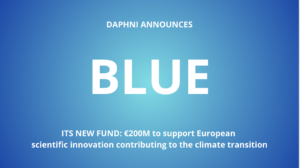Investing internationally is a full time job
Since the start of daphni in 2015, we have reviewed thousands of international deals. Even if we are a European VC, we get approached by startups from all corners of the world. Investing in Europe and the US, we review startups from the UK, Germany, Spain, the Nordics, the Baltics, Italy etc., on a weekly basis. Covering multiple markets different from our own, comes with high potential rewards, but also requires strong commitment on a daily basis. International coverage for an early stage VC (before Series B) is not exactly like expanding as a startup, but it requires effort, continuity and a bulletproof strategy. VCs tend to use different strategies to win the international play, but what we have in common is the hard work and thought behind it.

Understand what you’re taking on: To start with, you have to understand the markets you are covering. The startup ecosystem or funding capabilities for this market might be more or less advanced than the one you’re based in, meaning that you have to adapt. In addition, certain sectors might be more dominant than others, which often means that there is strong expertise in the field. More than this, you have to make a deep dive into the actors of the market, and the dynamics between these. It’s obvious that you have to keep good track of, and get to know the other VCs in this market (and understand the dynamics between these), but you also have to build relationships with successful serial entrepreneurs, angels, smart angels, incubators, accelerators, hubs, corporations, influential people from different fields, event organisers, universities — to just name a few. Also, don’t make the mistake of only focusing on the capital — many markets have smaller hubs based on specific expertise, where rare pearls can be found. Last but not least, covering other European markets naturally means that you have to understand their cultures, as this marks the startup ecosystem and explains how people behave. It is not a criteria to have investors from the respective markets inside your team, but it helps to transmit smaller cultural differences that otherwise might have been neglected.
Build strong relationships. Beyond understanding, it’s of high importance to initiate, care for and grow relationships in new markets. When covering markets where you are not based yourself, you have to learn from people operating in these markets and build qualitative and trustworthy relationships with key actors. We all know that building relationships takes time and while it is not a surprise that VCs are social animals looking to make connections, our high willingness to collaborate and share might come as a surprise. At daphni, it is part of the routine to not only meet with angels and other VCs very frequently, but also to have frequent update calls with them, where we share which companies we have seen, trends that should be considered, which events one should attend etc. Making intros is at the heart of every VC, and we love to see the ecosystem get closer and more dynamic.

Attend (selected) events. Over the last three years, we have attended tons of events across Europe, in Asia and in the US. Slush, NOAH, The Next Web, Web Summit, EU Startup Summit, Tech BBQ, Latitude59, TOA, Startup Extreme, Sthlm Tech Fest, VivaTech, Arctic15, SaaStr.. the list never ends. The beauty of events, is that they bring together the most important actors from different ecosystems, and that you’re given the opportunity to meet with many of them during an intense period. Not only are events providing you with the latest industry trends and highly interesting panel discussions, but they give you a clear and structured opportunity to network with other VCs and entrepreneurs. Sounds fun? Yes it is — but don’t let me fool you, it’s not that simple. Events require hours and hours of planning, both pre-event in terms of researching and figuring out who you want to meet during this short amount of time, as well as which side events to attend, and post-event planning, in terms of following up and maintaining relationships with the people you have met. With this said, you have to find a good balance — not all events are worth your time.
Besides the bigger tech events, we are also attending demo days from incubators and from VCs, where they are presenting their portfolio companies. We’re also hosting many events ourselves and together with other VCs, both in France and abroad, to meet with other key players, build stronger relationships, share knowledge and of course show our commitment in other regions. One of the more special (and definitely memorable) events we organised this year was Techbikers between Perpignan and Barcelona (yes, through the Pyrenees!). Every year, we co-organise The VC Bridge event together with Founders Factory and European VCs. We host breakfasts, lunches, dinners, round tables and drinks all around Europe on a regular basis.

In sum, attending events means constantly feeding ourselves with new information. We are open minded and have no certainty about what the future will bring. For that reason, events are great occasions to feel new trends and try to anticipate them.
Be on the ground, often. Besides attending the bigger events and the demo days, it is important to be on the ground on a frequent basis. Video calls in all glory, but often these are not enough. Not only are you standing the risk of losing out on the natural vibe and dynamics, which you get when being based in the market you’re covering, but you are also less available to meet with founders or other VCs quickly. As early stage investors, getting a feel for founders and their capabilities is of utmost importance, and profound relationships are naturally built when actually meeting in person. In the same way, founders want the chance to get a feel for you as a VC. On top of this, you have to show presence, as this shows your actual commitment in the market. In other words, travelling is a big part of the daily life at daphni.

Be creative in deal sourcing. Above, several different ways of getting great and qualitative deal flow are presented, but if you are aiming for the stars, like we are at daphni, you have to go beyond this. Our next portfolio company might not be on the radar of other VCs, not residing in an incubator or attending the event we are attending. At daphni, we put on our creative glasses and find and attract deal flow in other ways too. Reading newsletters, industry reports, crunchbase-ing, meeting with industry experts are a few among the many activities we are involved with on a daily basis. As a cliffhanger, we are working on a digital tool on top of our platform, to enhance our capabilities to identify startups before they even know that they need us.
Build a strong brand. By doing all of the above, we have built and become part of the international ecosystem, allowing us to see great deals across Europe and have strong relationships with key players. However, being international starts from the inside too. At daphni, we have worked hard to stand out from the crowd, by not only having a competitive platform model with a community of experts, adding strong value to different players, but we are also building and improving our brand on a daily basis. Besides hosting many events inviting the ecosystem to get to know us better, we produce a lot of content showing our commitment in the field. Our content and brand attracts international and qualitative startups and allows us to meet with companies and people from across the world. Last, but not least, like VCs typically say — investing into a company is like a marriage, which means that we have to offer outstanding value for startups.




 Now more than ever, it’s time to invest in Europe’s
Now more than ever, it’s time to invest in Europe’s